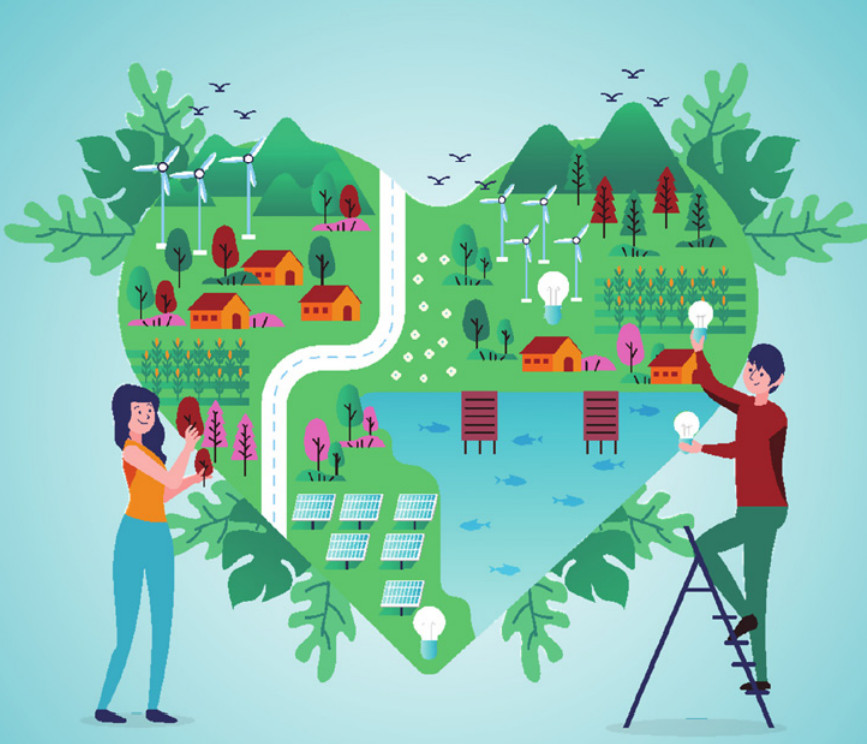Special Issue - Bottom-up approach for integrating sustainability in academia
Newsletter
Explore how embedding sustainability at the foundational level of academia prepares students for global challenges while making them adept at advocating for change.
Bionote
Srishti Goyal is currently pursuing a PhD in Economics at Universitat Rovira i Virgili, Spain, where she focuses on analyzing the distributional impacts of climate change from a general equilibrium perspective. In her previous roles at Young Lives India and UNESCO-MGIEP, she utilized her analytical skills to enhance educational and social initiatives. These experiences have deepened her commitment to evidence-based research that directly informs policy-making. She is dedicated to ensuring that her work positively influences the policy landscape and contributes effectively toward achieving sustainable development goals. Her research connects economic policies with environmental and social outcomes, aiming to create well-beingfocused and sustainable policy frameworks.

Sustainability in academia involves a comprehensive integration of environmental stewardship, social equity, and economic viability into educational policies, curricula, and institutional operations. This approach is crucial for nurturing an academic culture that supports the holistic development of students as global citizens who are environmentally conscious and socially responsible. Specifically, it encompasses efforts to reduce environmental impacts, promote social justice, and ensure economic efficiency within and beyond the educational setting.
A key component of these efforts is aligning with the United Nations Sustainable Development Goals (SDGs), particularly SDG 4, which aims to ensure inclusive, equitable quality education and promote lifelong learning opportunities. Specifically, SDG 4.7 focuses on equipping all learners with the knowledge and skills needed to promote sustainable development. Integrating sustainability in academics directly supports SDG 4.7 by broadening students’ understanding of sustainability across disciplines and preparing them to address complex global challenges. This approach enhances education quality by embedding critical thinking, problem-solving, and global awareness, which are essential for societal progress.

Despite the critical role of sustainability in shaping the future, academia struggles to fully embed these principles across its core activities, including education, research, operations, and community outreach (Ramos et al., 2015). To address this challenge, this article champions a foundational, bottomup approach to embed sustainability within the academic curricula. This strategic shift is essential not only for educating individuals and preparing them to address contemporary challenges holistically but also for transforming learning environments to produce future professionals capable of contributing effectively to global sustainability efforts, including the broader goals of education for all.
Challenges in sustainability education
There is often a myopic focus on the environmental dimension amongst the students and teachers (Birdsall, 2014; Silveira et al., 2021). This limited perspective neglects the crucial socio-economic aspects that are essential for a comprehensive understanding of sustainability. Sustainability, to be fully appreciated and effectively implemented, must integrate all these dimensions. Education should not only inform about environmental issues but also address the interconnectedness of societal and economic impacts.
Historical efforts and ongoing challenges
Historical efforts following the Talloires Declaration in 1990 began recognizing the role of educational institutions in promoting environmental sustainability (ULSF, 1990). Forums like the one at Macquarie University emphasized integrating sustainability into curricula (Reid & Petocz, 2006). However, initiatives such as the University of Pennsylvania’s Integrating Sustainability Across the Curriculum (ISAC) program have largely focused on specialized sustainability courses rather than integrating them across all disciplines (University of Pennsylvania Environmental Innovations Initiative, 2023). Studies indicate that while some Australian universities have incorporated sustainability in engineering curricula, the integration remains limited (Arefin et al., 2021). Similarly, Spanish universities have introduced sustainability through innovative methods in specific areas (Lafuente-Lechuga et al., 2024). This narrow focus highlights the challenge of achieving seamless integration of sustainability education across disciplines (Usha Iyer-Raniga et al., 2013).
Discrepancies between intent and implementation
The disconnect between initial commitments to sustainability, as outlined in the SDGs, and their comprehensive integration into educational curricula is highlighted by various studies. Observations show that even innovative teaching methods like flipped classrooms for courses such as “Economic Planning" and "Caribbean Social Problems” at the University of the West Indies are exceptions rather than the norm (Griffith & Moore, 2020). Further compounding this issue, the “Rethinking Schooling for the 21st Century” report exposes significant deficiencies in integrating sustainability into school curricula across Asia (Mochizuki & Vickers, 2019). Additionally, a report exposes significant deficiencies in integrating sustainability into school curricula across Asia. Secondary school economics curricula and textbooks were analyzed, revealing that textbooks often omit fundamental sustainability concepts like externality, green growth, limits to growth and planetary boundaries. Moreover, it was found that Indian textbooks inadvertently perpetuate gender norms. Interestingly, Bhutanese curricula that do incorporate sustainability principles still rely on Indian textbooks, which lack these essential teachings. This discrepancy highlights the gap between curricular intent, inspired by the SDGs, and actual educational delivery, emphasizing the need for textbooks that align closely with the curricula to ensure that the intended sustainability concepts are effectively taught.
Takeaways
Moving forward, it is crucial for the academic community to deeply embed sustainability principles from the ground up. By transforming our approach to education, we ensure that students not only learn about sustainability but are also fully prepared to apply these principles across various professional and personal contexts. This not only equips them as informed and capable global citizens who can drive sustainable development but also ensures that future professionals are ready to tackle the complex challenges of our times. Comprehensive commitment to these integrative efforts is essential for securing a sustainable future for all, and fostering an environment where innovation and responsiveness to global challenges flourish.
Srishti Goyal
MSCA - MFP COFUND Fellow
Universitat Rovira i Virgili
srishti.goyal1808@gmail.com
References:
Arefin, Md. A., Nabi, Md. N., Sadeque, S., & Gudimetla, P. (2021). Incorporating sustainability in engineering curriculum: a study of the Australian universities. International Journal of Sustainability in Higher Education, 22(3), 576–598.
Birdsall, S. (2014). Measuring student teachers’ understandings and self-awareness of sustainability. Environmental Education Research, 20(6), 814–835.
Griffith, A., & Moore, W. (2020). A comparative analysis of approaches to integrating sustainability into the curriculum at a university in a small island developing state in the caribbean. In E. Sengupta, P. Blessinger, & T. S. Yamin (Eds.), Integrating Sustainable Development into the Curriculum (Vol. 18, pp. 41–56). Emerald Publishing Limited.
Lafuente-Lechuga, M., Cifuentes-Faura, J., & Faura-Martínez, Ú. (2024). Teaching sustainability in higher education by integrating mathematical concepts. International Journal of Sustainability in Higher Education, 25(1), 62–77.
Mader, C., Scott, G., & Abdul Razak, D. (2013). Effective change management, governance and policy for sustainability transformation in higher education. Sustainability Accounting, Management and Policy Journal, 4(3), 264–284.
Mochizuki, Y., & Vickers, E. (2019). Rethinking Schooling for the 21st Century: The State of Education for Peace, Sustainable Development and Global Citizenship in Asia The State of Education for Peace, Sustainable Development and Global Citizenship in Asia.
Negre, J. S., Forgas, R. C., & García, O. Á. (2012). El concepto desarrollo sostenible en la planificación del profesorado y según el alumnado. Estudio de un caso. Revista Electrónica de Medioambiente.
Ramos, T. B., Caeiro, S., van Hoof, B., Lozano, R., Huisingh, D., & Ceulemans, K. (2015). Experiences from the implementation of sustainable development in higher education institutions: Environmental Management for Sustainable Universities. Journal of Cleaner Production, 106, 3–10.
Reid, A., & Petocz, P. (2006). University lecturers’ understanding of sustainability. Higher Education, 51(1), 105–123.
Silveira, M. dos S., Oestreich, L., Breunig, E. T., & Goldschmidt, A. I. (2021). Sustentabilidade e Práticas Sustentáveis: Concepções de Alunos de Quintos Anos do Ensino Fundamental. Revista Prática Docente.
ULSF. (1990). Talloires Déclaration. http://ulsf.org/talloires-declaration/ University of Pennsylvania Environmental Innovations Initiative. (2023). Integrating sustainability across the curriculum. https://environment.upenn.edu/integrating-sustainability-across-curriculum
Usha Iyer-Raniga, A., Mary, D., & Andamon, M. (2013). ProSPER.Net working paper integrating sustainability education into existing and built environment curriculum. https://prospernet.ias.unu.edu/wp-content/uploads/2013/07/PROSPERNET_2013_WP_ENG.pdf